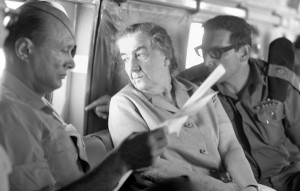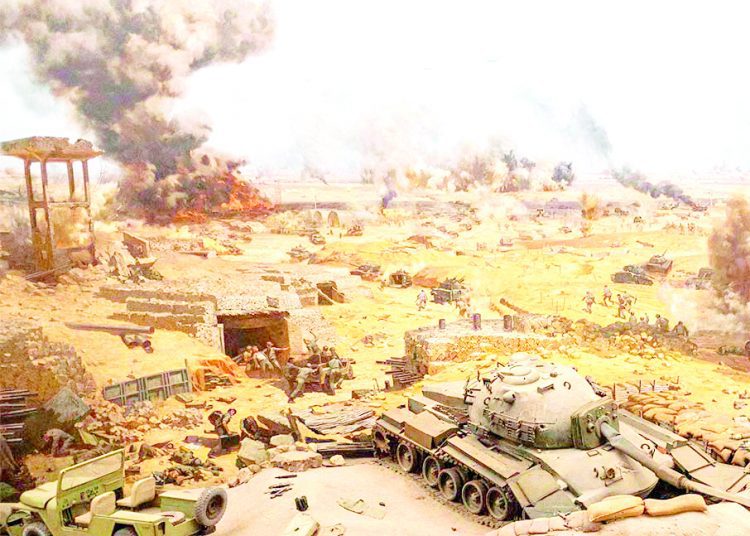By Sarah Saad
The book, Mahdal, (Negligence in Hebrew) is a historical document of paramount importance, demonstrating the bravery of Egyptian soldiers in dealing with enemies, despite Israeli military censorship and the removal of full chapters from it.
 The book is an Israeli testimony that the so-called ‘invincible’ Israeli army is nothing more than a myth that was shattered by the courageous troops of Egypt.
The book is an Israeli testimony that the so-called ‘invincible’ Israeli army is nothing more than a myth that was shattered by the courageous troops of Egypt.
In the 14th chapter of her book, My Life, late Israeli Prime Minister, Golda Meir, says: “I won’t write about the war from a military perspective. I will leave this to others, but I will write about it as a disaster and a nightmare I went through myself. It will live with me forever”.
Meir mentions that Israel’s military ship was about to sink completely and that she had implored late US president, Richard Nixon, to rescue Israel from destruction.
Meir sighed in relief only after American support had arrived in Ben Gurion Airport.
She says then-defence minister, Moshe Dayan, was pessimistic and submitted his resignation twice during the war.
Dayan, Meir says in the book, entered her office and stood still before saying: “Do you need my resignation? I’m ready to submit it”.
Meir replied by saying: “Unfortunately, the minister of defence has to remain in his post”.
“After this, he started explaining the situation on the southern front, and I listened to him with horror,” Meir says in the book.
She adds that she thought of committing suicide in the first days of the war.
Before the October War, she says, she used to say that Egypt does not have the power to wage war, especially in the absence of a leader who can take a decision in this regard, unless he wanted to send his people to destruction.

The sirens that howled at 1:50pm on October 6, 1973, Meir says, were not only an alarm for Israeli citizens to hide, but also the sound that echoed while burying the dead, and the dead at that time was the power that cannot be defeated.
After a quarter of a century of establishing Israel, she adds, Israel’s old pillars are in ruins thrown on the side of the road.
“The Egyptians crossed the Suez Canal, beating our forces harshly in Sinai,” she says. “The Syrians reached the depth of the Golan Heights and we sustained severe losses on both fronts.”
She notes that the painful question at that time was whether she and other leaders would make citizens aware of the bad situation of the Yom Kippur war, not as a military report, but as a close disaster or a terrible nightmare they suffered and will be with them forever.
Dayan admitted during investigations that the October War proved that Israel is not more powerful than Egypt and that the idea that Israel is more politically and militarily powerful than the Arabs was shattered on October 6, 1973.
He agonisingly said: “I misunderstood the ability of the Egyptian forces to build bridges and cross efficiently the eastern bank of the Suez Canal within a few hours”.
Dayan stressed that Israel lost hope in any counterattack to force Egypt to leave the territories it liberated east of the canal.
“Israel lost numerous fighter jets and tanks,” Dayan conceded.
Dayan added that there was misjudgement at all levels and that Israel thought that it could defeat the Egyptians on the first day of the war and pushing them back to the western bank of the Suez Canal.
The Israeli defence minister tried in his diaries, published three years after the war, to improve his image before the Israeli public, forgetting that he wanted to give up during the war when he submitted his resignation three times to Meir.
He also forgot that the relatives of the dead of the October War prevented him from lecturing at Tel Aviv University in 1974 and called for bringing him to court, calling him ‘the minister of scandal’.
He wrote in his diaries: “The October War was like an earthquake that Israel experienced. What happened in the war made us see things we could not see before, which led to change”.
Former chief of staff of the Israeli army, Haim Bar, described Operation Abirey-Halev as a ‘suicidal adventure’.
“The Egyptians were able to kill our forces completely within hours and inflict thousands of casualties on us,” he said. “Egyptians’ respect for the decision of ceasefire was like a bullet of mercy for our soldiers and officers.”
Late Israeli prime minister, Ariel Sharon, said of Operation Abirey-Halev: “I realise that all Israeli forces west of the Suez Canal will be taken hostage by the Egyptians, if the fight starts once again”.
“Without extending the airlift, Israel will not stand more than another 48 hours,” Nixon said about the October War.
Gen. Yitzhak Rabin said Israel has military plans to encounter all possibilities, but it seems that the possibility of the Egyptian massive assault in the afternoon of October 6 was not included within the Israeli possibilities, so they were defeated
badly.






Discussion about this post